www.thornwalker.com/ditch/snieg_prefiguration_03.htm
Reprint rights.
This
page © 2005 WTM Enterprises.
Article © 2005 Stephen J.
Sniegoski.
All rights reserved.
Return to
Part One
Return to Part
Two
Gulf
War 1991:
Prefiguration and prelude
to the 2003 Iraq
debacle
Part Three
(conclusion)
By STEPHEN J. SNIEGOSKI
| If you find this essay of value, please send a
donation of $3 to TLD. More information appears below. |
Rejecting an American occupation of Iraq as too dangerous, the first President Bush
sought to remove Saddam by less aggressive means. In May 1991, he signed
a presidential finding directing the CIA to create the conditions for
Saddam's ouster. As it emerged, the plan consisted largely of generating
propaganda and supporting the Iraqi dissidents who came to form the Iraqi
National Congress. The hope was that members of the Iraqi military would
turn on Saddam and stage a military coup. That was not to happen.
In the process of terminating the war on Iraq, the Bush administration
allowed Saddam to brutally suppress uprisings by the Kurds and the Shi'ites.
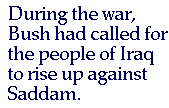 What made that seem like an especially immoral betrayal was the fact that,
during the war, Bush had called for the people of Iraq to rise up against
Saddam. Now, as Saddam smashed the rebellions, neoconservatives and
other supporters of Israel were outraged. A.M. Rosenthal angrily declared
that "that by betraying the rebels the U.S. is truly intervening — on the
side of the killer Hussein." To the argument that American intervention
might break up Iraq, Rosenthal questioned the need for a unified Iraq:
"Anyway, were Americans sent into combat against Saddam Hussein so that
Washington should now help him keep together the jigsaw
country sawed out of the Middle East by the British after World War I?" [52] Here Rosenthal
was questioning the entire principle of stability that had traditionally
guided American policy in the Middle East.
What made that seem like an especially immoral betrayal was the fact that,
during the war, Bush had called for the people of Iraq to rise up against
Saddam. Now, as Saddam smashed the rebellions, neoconservatives and
other supporters of Israel were outraged. A.M. Rosenthal angrily declared
that "that by betraying the rebels the U.S. is truly intervening — on the
side of the killer Hussein." To the argument that American intervention
might break up Iraq, Rosenthal questioned the need for a unified Iraq:
"Anyway, were Americans sent into combat against Saddam Hussein so that
Washington should now help him keep together the jigsaw
country sawed out of the Middle East by the British after World War I?" [52] Here Rosenthal
was questioning the entire principle of stability that had traditionally
guided American policy in the Middle East.
"Two months after a brilliant military campaign ended in victory, Mr. Bush
has achieved the worst of worlds for millions of Iraqi rebels and for
American policy in the Mideast," opined Rosenthal in the New York Post of
April 23, 1991. But the solution Rosenthal had in mind involved more than
just providing immediate protection for the Kurds and Shi'ites. He emphasized that "there will be no peace as long as Saddam
Hussein rules, and threatens to rise again." [53]
Rosenthal presented what would become the key neocon solution
for the Middle East — regime change and democracy. He contrasted the
reliance on a democratic approach to the traditional policy of "realism" in
the Middle East, which the Bush administration continued to pursue in the
aftermath of Gulf War I:
For many years now the "realists" have dominated American foreign policy,
particularly on the Middle East. They constantly search for a "balance of
power" that is unattainable because it is based on dictatorships, which by
their very nature are the cause of instability. They dismiss the concept of
morality in international affairs and believe that democracy is impossible
in the Middle East.
Yes, it is impossible — as long as the realists have their way and we
appease the Saddam Husseins and Hafez al-Assads of the area, coddle the
oil despots and are in a constant twitch of irritation about our support of
Israel, the only democracy in the area.
Just see where Realpolitik has gotten us in the Mideast: Iran in the hands of
religious fanatics, Syria and Libya ruled under terrorist fascism, Saddam
Hussein still in power, marauding — and a million Iraqi
refugees clawing for food, crying out their hunger and betrayal. [54]
William Safire, too, wrote of the immorality of abandoning the Kurds and
Shi'ites. "Must history remember George Bush as the liberator of Kuwait and
the man who saved Iraq for dictatorship?" Safire asked. "U.S. troops will return home with a sense of shame at the
bloodletting that followed our political sellout." [55]
Krauthammer would blame Bush's failure to intervene to save the Kurds and
Shi'ites on the president's risk-averse personality, in respect of which his war on Iraq
represented an aberration:
After seven months of brilliant, indeed heroic, presidential leadership,
George Bush's behavior after the Persian Gulf War — his weak and
vacillating hands-off policy — is a puzzle. The best explanation is
this: Bush was like the man who wins the jackpot in a casino and walks
right out the front door refusing even to look at another table. There are
many reasons Bush decided to cash in his chips even if that meant
abandoning the Iraqi rebels to Saddam Hussein's tender mercies — a
policy partly reversed when the extent of the Kurdish catastrophe became
clear. There was the fear of getting dragged into a civil war, a belief that
international law and the wartime coalition would support saving Kuwait's
sovereignty but not violating Iraq's, and his susceptibility to pressure from
his Saudi friends, who feared both the fracturing and democratization of
Iraq. These were all factors, but the overwhelming one was the president's
persona: A man of pathological prudence, having just risked everything on
one principled roll of the dice, was not about to hang around the gaming
room a second longer. It was a question of political capital. After
30 years in politics Bush had finally amassed it. He was not about to
spend it in Kurdistan. The willingness to risk political capital is not just a
sign of greatness in a leader, it is almost a definition of it. [56]
But the fact is that while the Bush administration maintained the
traditional concern of American foreign policy for stability in the Middle
East, it was willing to risk political capital: it was willing to return to
pressuring Israel to move away from its effort to colonize the West Bank.
In defying the powerful domestic Israel lobby, that policy was bound to stir
up a hornet's nest for the Bush administration. But the postwar public-opinion polls showed overwhelming support for President Bush. In early
March 1991, just as the war ended, Bush's approval rating stood at a stratospheric 90 percent. [57] That seemed to
provide enough political cushion against the inevitable damage that Bush
and Baker would suffer in pursuing their foreign-policy agenda.
Essentially, that policy sought to fit U.S. policy toward Israel within the
overall framework of maintaining stability in the region. It saw Israel as
the unstable element. If the Jewish state would make concessions to the
Palestinians, tension would subside across the entire Middle East, for it
was the Israeli oppression of the Palestinians that created a major Arab
grievance exploited by anti-American destabilizing elements in the
region.
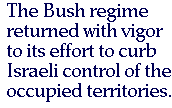 The Bush administration now was especially desirous of placating the Arab
coalition that had supported the war, by making American policy in the
Middle East more even-handed. In supporting a Western attack on a fellow
Muslim and Arab country, the leaders of the Middle Eastern states had
risked engendering internal opposition from religious and nationalistic
elements, and those rulers expected some reward for their loyalty to the
United States.
The Bush administration now was especially desirous of placating the Arab
coalition that had supported the war, by making American policy in the
Middle East more even-handed. In supporting a Western attack on a fellow
Muslim and Arab country, the leaders of the Middle Eastern states had
risked engendering internal opposition from religious and nationalistic
elements, and those rulers expected some reward for their loyalty to the
United States.
Bush and his people thus returned with vigor to their pre-war effort of
trying to curb Israeli control of its occupied territories. They focused on a
demand that Israel stop constructing new settlements in the occupied
territories, as a condition for receiving $10 billion in U.S. loan
guarantees for the resettlement of hundreds of thousands of immigrants
from the former Soviet Union. Despite Washington's objections, Israel had
launched a building boom in the occupied territories intended by Prime
Minister Shamir's rightist government to ensure permanent Israeli control
there. The plan would boost the Jewish settler population by
50 percent in two years. Asked in early April 1991 how Israel would
respond to a U.S. request to freeze Jewish settlement activity, Ariel
Sharon, then housing minister, adamantly stated that "Israel has always built, is building, and will in future build in Judea, Samaria
[biblical names for the West Bank], and the Gaza Strip." [58] In May 1991,
Secretary Baker harshly condemned the Jewish settlements in testimony
before the Foreign Operations subcommittee of the House
Appropriations committee, asserting that "I don't think that there is any
bigger obstacle to peace." [59]
Shamir's Likud government and Israel's American supporters strongly resisted the Bush administration's efforts. In his news conference of September 12, 1991, Bush went before the TV cameras to ask Congress to delay consideration of the $10 billion in loan guarantees being demanded by Shamir. The president dared to speak directly of the pro-Israel pressure, saying that "I'm up against some powerful political forces, but I owe it to the American people to tell them how strongly I feel about the deferral.... I heard today there was something like a thousand lobbyists on the Hill working the other side of the question. We've got one lonely little guy down here doing it." [60]
In performing an end run around the Israel-friendly mainstream media and
appealing directly to the American people, however, Bush struck a
responsive chord. A public opinion poll two days later found that
86 percent of the American people supported the president on the
issue. But that public support apparently rendered some members of the
administration complacent about the political power of the pro-Zionist
lobby. When the danger of alienating Jewish-Americans was broached to
Baker, he was alleged to have uttered that most taboo-shattering of profanities: "F*ck the Jews. They didn't vote for us." [61]
Bush's opposition to Shamir's policy probably contributed to bringing down
the Likud government in January 1992. In the subsequent Israeli national
election in June 1992, Shamir lost to the Labor Party led by Yizhak Rabin,
which ran on the popular slogan "Land for Peace." (While Rabin was
amenable to pursuing a peace process with the Palestinians — for
which he was awarded a Nobel Peace prize in 1994 — the extent to
which Jewish settlements on the West Bank would be reduced and the
chances for a future viable Palestinian state were always questionable.)
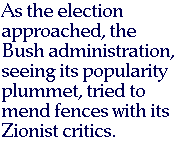 However, while the situation changed in Israel, supporters of Israel in the
United States remained intransigent. They were outraged over the
administration's public pressuring of Israel. The neocons set up an
organization to back the Israeli position on settlements, giving it the
Orwellian moniker Committee on U.S. Interests in the Middle East. Members included such neoconservative stalwarts as Douglas Feith, Frank Gaffney,
Richard Perle, and Elliot Abrams. [62]
However, while the situation changed in Israel, supporters of Israel in the
United States remained intransigent. They were outraged over the
administration's public pressuring of Israel. The neocons set up an
organization to back the Israeli position on settlements, giving it the
Orwellian moniker Committee on U.S. Interests in the Middle East. Members included such neoconservative stalwarts as Douglas Feith, Frank Gaffney,
Richard Perle, and Elliot Abrams. [62]
As the 1992 election approached, the Bush administration, seeing its
popularity plummet, tried to mend fences with its Zionist critics. In July
1992, Bush announced that Washington would provide the loan guarantees
after all. His concession won him no pro-Israel support.
The role of Israel's chief lobby, the American Israel Public Affairs
Committee (AIPAC), in the loan-guarantee controversy was starkly revealed in a
private conversation in October 1992 between the president of AIPAC,
David Steiner, and potential contributor Harry Katz, which the latter
secretly taped. Steiner boasted about AIPAC's political sway, saying he had
"cut a deal" with James Baker to give more aid to Israel. He
had arranged for "almost a billion dollars in other goodies that people don't
even know about." [63]
When Katz brought up the concern that Baker had cursed the Jewish people,
Steiner said, "Of course, do you think I'm ever going to forgive him
for that?" He acknowledged that AIPAC was backing Democratic
presidential candidate Bill Clinton, and had supported him before he
received the nomination. Steiner boasted that AIPAC had numerous
supporters in the Clinton campaign and that Clinton would put their people
in top positions when he entered office. In fact the Democratic platform
contained a strong pro-Israel plank (proving that not all platform planks are
just for show), and the Clinton campaign attacked the Bush administration
for "bullying" Israel.
Like other supporters of Israel, some neoconservatives were trending
toward Clinton. Richard Schifter, assistant secretary of state for human
rights under Reagan and the first Bush (until March 1992), had become a
senior foreign-policy advisor for the Clinton campaign. Schifter was also working with AIPAC's David Ifshin to bring fellow
neocons back into the Democratic Party. [64] And a number of
other neocons such as Joshua Muravchik, Penn Kemble, Morris Amitay,
Edward Luttwak, and R. James Woolsey would
openly back Bill Clinton. Many others remained at least cool to Bush's re-election. [65] Even longtime
conservative commentator William Safire would back Clinton. Moreover,
Clinton appealed to neocons by virtue of his support of the neoconservative
idea that promoting democracy should be a central feature of
American foreign policy. [66] The neocons
would see promotion of democracy as a means of undermining Israel's
enemies in the Middle East, none of which was ruled in a democratic
manner.
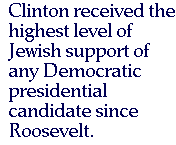 Many neocons with strong Republican connections were hesitant to
completely make the switch to Clinton, but they would at best be lukewarm
Bush supporters. Even a defense of Bush by one of those supporters, Daniel
Pipes, acknowledged the difficulties in supporting the president. "If there's
a lot of agreement on anything this election year," Pipes wrote, "it's that
friends of Israel should not vote to re-elect George Bush. The
mere mention of his name in Jewish circles evinces strong disappointment,
even anger." [67]
Many neocons with strong Republican connections were hesitant to
completely make the switch to Clinton, but they would at best be lukewarm
Bush supporters. Even a defense of Bush by one of those supporters, Daniel
Pipes, acknowledged the difficulties in supporting the president. "If there's
a lot of agreement on anything this election year," Pipes wrote, "it's that
friends of Israel should not vote to re-elect George Bush. The
mere mention of his name in Jewish circles evinces strong disappointment,
even anger." [67]
Clinton received the highest level of Jewish support of any Democratic
presidential candidate since Franklin D. Roosevelt. According to an
American Jewish Congress exit poll, 80 percent of American Jews
voted for Clinton, compared to 11 percent for Bush. In
1988, 35 percent of American Jewish voters had backed Bush. [68] And the George
H.W. Bush who emerged from the Gulf War with an astronomical
90 percent approval rating went down to a humiliating defeat.
What one sees in the first Gulf War is a temporary and partial shift from
America's traditional policy of working to maintain stability in the Middle
East to a policy firmly aligned with that of Israel to militarily defeat
Israel's greatest enemy at the time. While Washington had previously
provided arms to Israel to enable it to defeat its enemies — most
conspicuously in the arms airlift during the Yom Kippur War of 1973 —
the United States had never before gone to war against a primary enemy of
Israel. In fighting an enemy initially identified by Israel and its American
supporters, American policy in the 1991 Gulf War prefigured the
Bush II administration's war on Iraq, which would be on a much
grander scale.
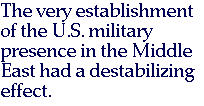 Under the Bush I administration, the war and the defeat of Saddam
still took place within the overall foreign-policy framework of maintaining
stability — and in its rejection of an American occupation of Iraq, the
administration certainly did everything it could to try to restore the status
quo, to the great consternation of the friends of Israel who desired regime
change and continued destabilization. However, as it happened, the very
establishment of the American military presence in the Middle East had a
destabilizing effect. It would feed into the popular grievances exploited by
Islamists such as Osama bin Laden. America would become a primary enemy on a
par with Israel.
Under the Bush I administration, the war and the defeat of Saddam
still took place within the overall foreign-policy framework of maintaining
stability — and in its rejection of an American occupation of Iraq, the
administration certainly did everything it could to try to restore the status
quo, to the great consternation of the friends of Israel who desired regime
change and continued destabilization. However, as it happened, the very
establishment of the American military presence in the Middle East had a
destabilizing effect. It would feed into the popular grievances exploited by
Islamists such as Osama bin Laden. America would become a primary enemy on a
par with Israel.
The drastic American military intervention into Middle East affairs had
unleashed forces that could not be reversed. The tinder was dry and needed
only the neocons of the Bush II administration to light the spark of a
new American war, utterly transforming American policy. To avoid the
likelihood of a future war, the United States would have had to pull out of
the region after 1991, and that was an approach alien to all Establishment
geostrategic thinkers, wedded as they have been to a policy of international intervention on the part of the U.S. government.
 The second, greater war would not have started when it did
had the neocons not been able to gain control of foreign policy in the George
W. Bush administration, a seizure of power that resulted from the 9/11
terrorist disaster. However, the neocons, though newly empowered, could
not have initiated the 2003 war if the earlier war had not taken place. In
that sense the 1991 Gulf War was a prelude to the 2003 war on Iraq, in
which the U.S. government would pursue a policy in complete harmony with
the thinking of the neocons and the Israeli Likudniks to precipitate regime
change and destabilize the Middle East.
The second, greater war would not have started when it did
had the neocons not been able to gain control of foreign policy in the George
W. Bush administration, a seizure of power that resulted from the 9/11
terrorist disaster. However, the neocons, though newly empowered, could
not have initiated the 2003 war if the earlier war had not taken place. In
that sense the 1991 Gulf War was a prelude to the 2003 war on Iraq, in
which the U.S. government would pursue a policy in complete harmony with
the thinking of the neocons and the Israeli Likudniks to precipitate regime
change and destabilize the Middle East.
March 8, 2005
Return to Part
One.
Return to Part Two.
© 2005 Stephen J. Sniegoski. All rights reserved.
This page © 2005 WTM Enterprises. All rights
reserved.
If you found this article to be interesting, please donate to our cause. You should make your check or m.o. payable in U.S. dollars to WTM
Enterprises and send it to:
WTM Enterprises
P.O. Box 224
Roanoke, IN 46783
Thanks for helping to assure a future for TLD!
Notice to visitors who came
straight to this document from off site: You are deep in The Last Ditch. You
should check out our home page and table
of contents.
 What made that seem like an especially immoral betrayal was the fact that,
during the war, Bush had called for the people of Iraq to rise up against
Saddam. Now, as Saddam smashed the rebellions, neoconservatives and
other supporters of Israel were outraged. A.M. Rosenthal angrily declared
that "that by betraying the rebels the U.S. is truly intervening — on the
side of the killer Hussein." To the argument that American intervention
might break up Iraq, Rosenthal questioned the need for a unified Iraq:
"Anyway, were Americans sent into combat against Saddam Hussein so that
Washington should now help him keep together the jigsaw
country sawed out of the Middle East by the British after World War I?" [52] Here Rosenthal
was questioning the entire principle of stability that had traditionally
guided American policy in the Middle East.
What made that seem like an especially immoral betrayal was the fact that,
during the war, Bush had called for the people of Iraq to rise up against
Saddam. Now, as Saddam smashed the rebellions, neoconservatives and
other supporters of Israel were outraged. A.M. Rosenthal angrily declared
that "that by betraying the rebels the U.S. is truly intervening — on the
side of the killer Hussein." To the argument that American intervention
might break up Iraq, Rosenthal questioned the need for a unified Iraq:
"Anyway, were Americans sent into combat against Saddam Hussein so that
Washington should now help him keep together the jigsaw
country sawed out of the Middle East by the British after World War I?" [52] Here Rosenthal
was questioning the entire principle of stability that had traditionally
guided American policy in the Middle East. The Bush administration now was especially desirous of placating the Arab
coalition that had supported the war, by making American policy in the
Middle East more even-handed. In supporting a Western attack on a fellow
Muslim and Arab country, the leaders of the Middle Eastern states had
risked engendering internal opposition from religious and nationalistic
elements, and those rulers expected some reward for their loyalty to the
United States.
The Bush administration now was especially desirous of placating the Arab
coalition that had supported the war, by making American policy in the
Middle East more even-handed. In supporting a Western attack on a fellow
Muslim and Arab country, the leaders of the Middle Eastern states had
risked engendering internal opposition from religious and nationalistic
elements, and those rulers expected some reward for their loyalty to the
United States. However, while the situation changed in Israel, supporters of Israel in the
United States remained intransigent. They were outraged over the
administration's public pressuring of Israel. The neocons set up an
organization to back the Israeli position on settlements, giving it the
Orwellian moniker Committee on U.S. Interests in the Middle East.
However, while the situation changed in Israel, supporters of Israel in the
United States remained intransigent. They were outraged over the
administration's public pressuring of Israel. The neocons set up an
organization to back the Israeli position on settlements, giving it the
Orwellian moniker Committee on U.S. Interests in the Middle East.  Many neocons with strong Republican connections were hesitant to
completely make the switch to Clinton, but they would at best be lukewarm
Bush supporters. Even a defense of Bush by one of those supporters, Daniel
Pipes, acknowledged the difficulties in supporting the president. "If there's
a lot of agreement on anything this election year," Pipes wrote, "it's that
friends of Israel should not
Many neocons with strong Republican connections were hesitant to
completely make the switch to Clinton, but they would at best be lukewarm
Bush supporters. Even a defense of Bush by one of those supporters, Daniel
Pipes, acknowledged the difficulties in supporting the president. "If there's
a lot of agreement on anything this election year," Pipes wrote, "it's that
friends of Israel should not  Under the Bush I administration, the war and the defeat of Saddam
still took place within the overall foreign-policy framework of maintaining
stability — and in its rejection of an American occupation of Iraq, the
administration certainly did everything it could to try to restore the status
quo, to the great consternation of the friends of Israel who desired regime
change and continued destabilization. However, as it happened, the very
establishment of the American military presence in the Middle East had a
destabilizing effect. It would feed into the popular grievances exploited by
Islamists such as Osama bin Laden. America would become a primary enemy on a
par with Israel.
Under the Bush I administration, the war and the defeat of Saddam
still took place within the overall foreign-policy framework of maintaining
stability — and in its rejection of an American occupation of Iraq, the
administration certainly did everything it could to try to restore the status
quo, to the great consternation of the friends of Israel who desired regime
change and continued destabilization. However, as it happened, the very
establishment of the American military presence in the Middle East had a
destabilizing effect. It would feed into the popular grievances exploited by
Islamists such as Osama bin Laden. America would become a primary enemy on a
par with Israel.